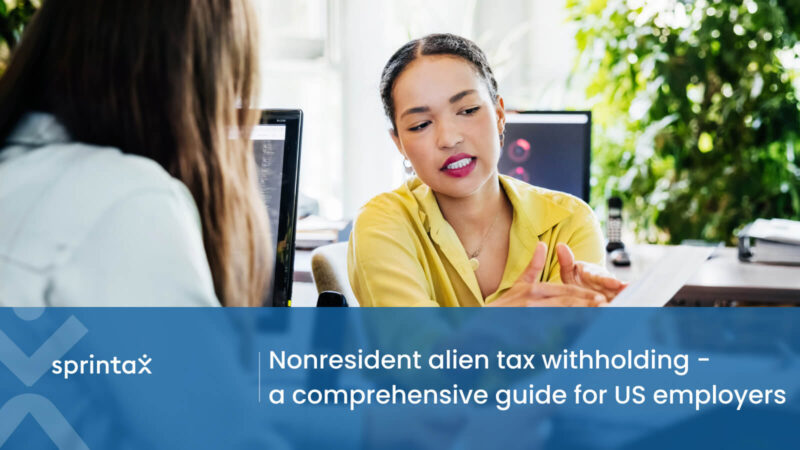As an employer in the US, before you begin the process of hiring nonresident alien (NRA) employees, you should know that there are a number or rules which must be followed in order to properly withhold tax from an NRA.
With that in mind, the Sprintax team have put together this guide which discusses some of the key factors that any employer should consider when hiring nonresident alien employees!
Table of Contents Show
First things first!
How can you work out if your employees are residents or nonresidents for tax?
And how is tax residency determined?
In order for an individual to be deemed a resident alien for tax purposes they need to meet either the Substantial Presence Test or the Green Card Test for the calendar year.
The Green Card Test
If the nonresident is legally residing permanently in the US, they will be considered a lawful resident of the US. In order to secure this status, the US Citizenship and Immigration Services will need to issue them an alien registration card, Form I-551, also known as the Green Card.
The Substantial Presence Test
This test identifies whether a foreign worker is a resident or nonresident alien for tax purposes.
To meet the Substantial Presence Test, an individual must be be physically present in the US on at least:
- 31 days throughout the current year, and
- 183 days throughout the 3-year period which encompasses both the current year and the 2 years immediately before that, including:
- All the days you were in the US during the current year, and
- 1/3 of the days you were present in the first year before the current year, and
- 1/6 of the days you were present in the second year before the current year
If an individual doesn’t not pass this text they will be considered a nonresident for tax purposes.

How do I know if my organization is a withholding agent?
The IRS defines a ‘withholding agent’ as any individual or organization that pays income to a foreign person which is subject to tax withholding.
This can include any entity such as individuals, corporations, trusts, associations, or anyone who is acting as agents or intermediaries.
Therefore, the majority of organizations in the US who employ nonresidents will be considered withholding agents.
How does nonresident tax withholding work in the US?
Most nonresident aliens are subject to different tax withholding rules than resident alien employees.
For instance, nonresident aliens are taxed only on their US source income and their exact rate of tax withholding will depend on their personal circumstances.
For example, the nonresident may be entitled to avail of tax treaty benefits which enable them to pay tax at the reduced rate.
What’s more, it’s important to be aware that nonresidents typically do not qualify for the same tax credits that resident aliens do.
What percentage of tax is withheld on nonresident aliens?
While there is no one rule for all nonresidents, as each case can differ, most US-sourced income earned by a nonresident is subject to a tax withholding rate at 30% (called “NRA withholding”).
However, as mentioned above, a reduced rate or even exemption may apply to some nonresident aliens, if an Internal Revenue Code Section provides for a lower rate, or if there is a tax treaty between the nonresident’s home country and the US.
Usually, a graduated rate of tax is already withheld from any payment made to the NRA.
What income is subject to NRA withholding
There are three important pillars that can be used in order to properly determine the correct payment and tax withholding requirements of a nonresident worker.
Knowing the answers to these three questions can allow you will be able to properly determine how any individual should be treated from a tax and payroll perspective:
- Is the individual a US resident or nonresident for tax purposes?
- Knowing the type of income is the individual receiving – for example, is it employment, scholarship or royalties?
- Is the income US-sourced or foreign-sourced?
As previously mentioned, as an employer, you are classed as a withholding agent, and therefore should be withholding tax at a rate of up to 30% on the nonresident.
Chapter 3 of IRC
Chapter 3 of the Internal Revenue Code (IRC) pertains to the withholding of income taxes from wages paid to employees by employers.
Under Chapter 3 of the IRC, employers are required to withhold income taxes from their employees’ wages based on the information provided by the employee on Form W-4. What actually determines the amount is based on a variety of factors, such as the employee’s filing status, number of allowances claimed, and other factors that affect their tax liability.

Should Social Security and Medicare (FICA) be withheld from nonresident alien employee salary?
Again, that depends!
In general, nonresident employees are exempt from paying Social Security and Medicare taxes for the first five years of their employment in the US.
However, there can be exceptions to this rule, such as for employees on certain visa categories or if they are residents of certain countries.
FICA exemption does not apply to:
- Spouses and children on F-2, J-2, M-2, or Q-3 nonimmigrant status
- Nonresidents who are in employment which is not allowed by USCIS or in employment which isn’t linked to the reason their visa was issued
- Nonresident aliens present in the US on F-1, J-1, M-1, or Q-1/Q-2 visas who then change to an immigration status which is not exempt or to a special protected status
- Nonresident aliens in the US on F-1, J-1, M-1, or Q-1/Q-2 visas who become resident aliens
- If the exemption period has passed – this is 2 years for J and Q visas and 5 years for F and M students
The employment that the nonresident alien is performing should be closely connected to the purpose for which the visa was granted.
Once the employee becomes a resident alien by IRS rules, they will need to start paying taxes.
| Visa | FICA exemption |
|---|---|
| F-1 | Exempt for 5 years following date of entry; after they may be exempt based on student enrollment. |
| J-1 Student | Exempt for 5 years following date of entry; after they may be exempt based on student enrollment. |
| J-1 Scholars & Researchers | Exempt for either 2 of their first calendar years in the US, or 2 out of the first 6 calendar years in the US. |
| H-1B and O-1 | Will pay FICA tax |
| J-2 and H-2 | Will pay FICA tax |
Does the recipient have to provide an SSN or ITIN in order to be paid?
As you are the withholding agent for the nonresident, you must generally request that the payee provide you with their SSN (Social Security Number) or ITIN (individual taxpayer identification number).
A SSN is required when the worker is expected to perform dependent personal services. In this case ITIN is not acceptable.
However, the ITIN is acceptable if the income is passive (dividends, rents, etc) or when the person is paid scholarship or grants.
What states have nonresident tax withholding?
Nonresidents are liable to play state tax, depending on the state they are living in.
That’s because only 41 of the US states tax workers at a state level, with some minor exceptions to the rule.
Essentially, factors deciding state income tax withholding for nonresidents differ by state, with different rules in each one.
Those that don’t charge state tax on income are:
- Alaska
- Florida
- Nevada
- New Hampshire (taxes investment income but not earned income)
- South Dakota
- Tennessee (taxes investment income but not earned income)
- Texas
- Washington
- Wyoming
How can help me with NRA tax withholding?
Sprintax Calculus is a NRA tax determination software that has been specifically designed in order to ensure that organizations and their nonresident alien employees are compliant with IRS rules and laws come tax time.
Our easy-to-use software allows you to manage the tax profiles of your nonresident population easily in one place – in the process making life a lot easier for your payroll office staff.
With Sprintax Calculus, you can also instantly generate key tax forms such as 1042-S, W-4, W-8BEN and more.
Want to learn more?
Why not register for a FREE demonstration of our software?
Simply complete the short form here to talk to one of our team members today!
Similarly, Sprintax Returns is the go-to federal tax e-filing and state tax return preparation site for nonresident aliens in the US.
When your nonresident employee sets up a Sprintax Returns account, they will ensure they are fully tax compliant with Internal Revenue Service (IRS) rules.
Better yet – nonresident aliens will receive their maximum legal US tax refund if they are due one.








